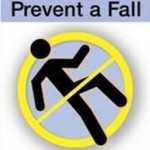 Fall prevention is very important for our elderly patients and for those rehabilitating from injury or surgery. Below are 6 important points to help reduce your risk of falls. Take charge, as this is an investment in your independence.
Fall prevention is very important for our elderly patients and for those rehabilitating from injury or surgery. Below are 6 important points to help reduce your risk of falls. Take charge, as this is an investment in your independence.
1. Make an appointment with your GP
Discuss the following issue with your GP
- What medications are you taking? Some changes may be required.
- Have you fallen before? What were the circumstances and how did you cope?
- Consider any health conditions that may put you at risk of fall. Muscle and joint problems, hearing or visual disturbance, dizziness, numbness, fatigue, balance and gait are all important factors.
- A home assessment my be required
2. Keep active.
“Use it or loose it” is a very true saying. Physical activity is important for general health and wellbeing, but is also an important fall prevention strategy.
Walking, swimming, water exercise, Tai Chi and dancing are possibilities. Your osteopath can design an appropriate combination of stretching and strengthening exercises to suit your needs and ability.
3. Wear sensible shoes
High fashion heels or slippers may not be the best. Supportive, comfortable shoes with cushion and grip are important. Where foot and gait problems are an issue we often conduct a computerised footscan as part of a biomechanical assessment. Sometimes we are able to modify existing shoes to improve support or we can prescribe and make a customised orthotic to go into your shoes. These services are provided at Vital Lifestyle Centre.
4. Remove hazards at home.
- Have a good look at home especially traffic areas. Remove loose chords or slippery mats. Be attentive to spills, plastic bags or newspapers lying around
- Floppy clothes or loose hems are a hazard too
- Non slip mats in bathroom are helpful
5. Lighting
Be sure to have good light in living spaces and pathways
- Night lights in bedroom, bathroom and hallways.
- Lamp and torch within reach of your bed.
- Remove obstacles between bed and light switches.
- Illuminated light switches.
6. Use assistive devices
Your GP might recommend using a cane or walker to help with balance. Be sure to keep using your muscles for weight bearing and maintain a balanced posture.
Other assistive devices include:
- Hand rails for both sides of stairways
- Nonslip treads on steps
- A raised toilet seat or one with armrests
- Hand rails for the shower, bath or toilet
- A shower seat
- Hand-held shower nozzle





